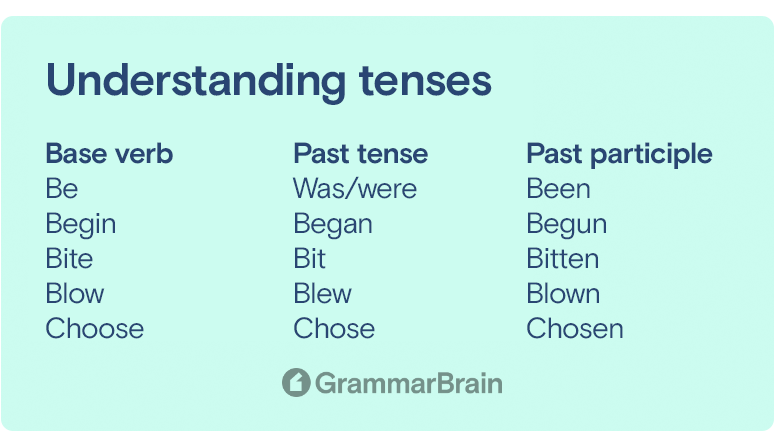
Using dove as the past tense of dive began in the 1800s, and is now standard in American English. For example, the past tense of the verb break is broke and the past participle is broken. The older past tense of dive is dived, which is still standard in British English. The past participle and the past tense of irregular verbs are not generally formed by adding (e)d or t. Use We use the continuous tense for actions or situations in the past that were not completed. The past participle of regular verbs is usually identical to the past tense, while the past participle of irregular verbs is often different: The past continuous tense is formed with the past tense of the verb to be and the present participle (-ing form). In many cases the terminal consonant is doubled before adding ed (see Spelling Words with Double Consonants). When a basic form ends in y, it is generally changed to i. If the verb is regular (or weak) add ed, d, or t to the present form. The present participle is often used as a modifier. For example, the word group I walking to the store is an incomplete and ungrammatical sentence, while the word group I am walking to the store is a complete sentence. Note that the present participle cannot function as a predicate unless it has an auxiliary verb. To form the present participle, the suffix ing is generally added to the basic form:

The infinitive form is a compound verb made up of the preposition to and the basic form: The basic form (or root) is the form listed in the dictionary, which is generally the first-person singular of the simple present tense (except in the case of the verb to be): There are four principal forms: basic or root, present participle, past and past participle.

#Swim past tense free
In addition, the free online education platform, DP IELTS, supports future leaders of Sri Lanka by providing access to all video learning materials for their study abroad and global job opportunities. Other verbs require you to change a vowel and add a new. DP IELTS provides excellent coaching in IELTS for students and learners in improving the English language skills in reading, writing, speaking & listening. The verb drive, for example, changes to drove in the past tense. With the irregular past tense, it is common for a vowel in the middle of the verb to change instead of the verbs ending. Odmiana sowa swim Present simple Present continuous Present perfect Present perfect continuous Past simple Past continuous Past perfect Past perfect. pluperfect subjunctive → past subjunctive to swim Conjugation edit This is a regular -er verb, but the stem is written nage- before endings that begin with -a- or -o- (to indicate that the -g- is a 'soft' // and not a 'hard' // ). Lets take a closer look at how the irregular past tense and past participles are formed. Haley Zega, 27, from Fayetteville, Arkansas, survived two days alone in the wilderness without food, water and shelter when she was just six years old after getting lost while on a hike.imperfect subjunctive → present subjunctive.Simple imperative of avoir + past participleġ The French gerund is usable only with the preposition en.Ģ In less formal writing or speech, these tenses may be found to have been replaced in the following way: Imperfect subjunctive of avoir + past participle Present subjunctive of avoir + past participle Imperfect indicative of avoir + past participle Present indicative of avoir + past participle Louis Blues 8-4 loss to the Minnesota Wild on Wednesday.

This is a regular -er verb, but the stem is written nage- before endings that begin with -a- or -o- (to indicate that the -g- is a "soft" /ʒ/ and not a "hard" /ɡ/). Jordan Binnington has been suspended two games for his latest antics in the St.

Homophones: nagé, nageai, nagée, nagées, nagés, nagez Perfect tenses present perfect have swum has swum past perfectiAlso known as: pluperfect had swum had swum future perfect will have swum will have.Here it is in the present tense: The following examples show you nadar in action: ¿Nadas todos los días (Do you swim every day) No. Displaced Old French noer, from Latin natāre, natō ( “ to swim ” ). Nadar (nah- dahr) (to swim) is a regular -ar verb, so its conjugation is pretty straightforward. From Old French nagier, inherited from a reduced form of Latin navigāre, present active infinitive of navigō.


 0 kommentar(er)
0 kommentar(er)
